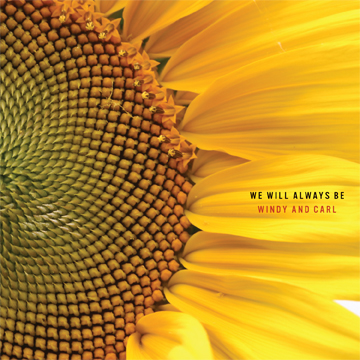“In the sun, in the moonlight, I love you,” Windy sings on “For Rosa,” the opening track on We Will Always Be, Windy & Carl’s eighth proper studio album. It’s a tender acoustic ballad backed by particularly gravelly static. Indeed, “love” has been the predominating theme across the married couple’s body of work: its ups and downs, its anxiety and lusciousness and sublimity and excitement and depressions. The duo’s music often recalls Dorothy Parker’s famous declaration: Oh, life is a glorious cycle of song / A medley of extemporanea; / And love is a thing that can never go wrong.” I’m not sure whether Windy or Carl would qualify as “Marie of Romania,” but the poem’s essence applies regardless.
Of course, love can and sometimes does go wrong for Windy & Carl sometimes; in fact, their previous album was titled Songs For The Broken Hearted. But the “point,” if there is such a thing with this kind of music, is that even during its most trepidatious or lonely nadirs, there is a beauty to experiencing love that overwhelms the heart. Windy & Carl seem to aim to replicate that overwhelming sensation through their music. You can hear it, if you listen carefully enough, in the Taylor Deupree-esque interplay of glockenspiel and trembling guitar on “Spires,” or in the shoegazing smears of noise that overtake “Looking Glass” like frost on a window during an early-morning chill.
Sometimes, this beauty is almost unsettling. By now we’re used to hearing Windy’s breathy vocals — her whispers that resound like passionate, between-the-sheets confessions — but when she chuckles on “Nature of Memory,” well… it’s a little weird. I guess love’s a little weird like that. I guess love’s like a lot of things, especially when it’s been domesticated for as long as Windy Weber and Carl Hultgren have been together.
Listening to this album, I wonder what Windy and Carl’s home life is like. Do they eat breakfast together each morning, admiring the steady sizzling of bacon on a PAM-coated frying pan? Who takes out the trash? When they file their taxes, do they make sure to print legibly or do they smear their figures in hasty ink, daring the IRS to try to solve their ambiguity? I wonder if they ever shower together, and if they do, I wonder whether they wash each other’s backs, scrubbing away greasy dirt and sweat with the kind of tender tenacity with which electric guitar notes hover over the base of white noise on “The Frost in Winter.” Spring cleaning must be a joyous occasion if it’s even half as sweet as the gentle buzzing of “The Smell of Old Books.” And assuming there truly is a symbiotic relationship between their relationship and their music, I wonder how mountains of reverb manifest themselves in the couple’s daily life. Maybe that mystery is the answer — the inevitable distance between artist and listener, the tantalizingly modern synth line that encroaches upon the end of “Old Books” as though they’ve been converting leather-bound editions into digital .pdf files.
Wonder — yes, there’s still much wonder to their music music. If you ever wanted to know what a Windy & Carl guitar solo might sound like, the 19-minute closing track “Fainting in the Presence of the Lord” contains your answer. It sounds like feedback and echo, of course, but it’s also got a bit of a hard-rock edge, just the faintest whiff of anger. It sounds like a married couple fighting over something trivial — someone forgot to get an oil change, or left the back door unlocked while they were at work—that resolves itself the way these arguments tend to do after a while: an eye-roll, a muttering trip to the grocery store to pick up milk, a brief period of mutual isolation during which both partners can compartmentalize and contextualize the disagreement in question. I can imagine Windy stewing in anger until she sees her husband return, quart of 2% in tow. His eyes are a bit bleary, but they radiate warmth all the same. His hair’s a bit of a mess. He looks like he just wants to curl up on the couch and watch a shitty movie.
Windy might pause, then, her prior annoyance evaporating like soda water as she admires the tired body of the man she married all those years ago. She might sigh and put down her newspaper and decide to join him. It’s always something, isn’t it, she thinks to herself. No matter; I love him, and he loves me. We’re an imperfect couple in imperfect love, and we will always be.

